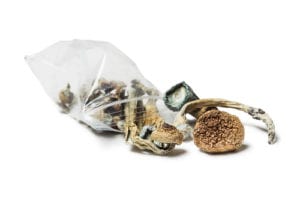Shrooms are a type of fungus also known more formally as psilocybe cubensis. Shrooms have been used for over 9 thousand years, but are used more recreationally today. They are known to produce “magical” effects on one’s brain.
When taken, the hallucinogenic and euphoric effects start taking place within approximately 30 minutes, and the effects last for about 4-6 hours. For some people, the effects can last up to a few days after consuming them. Shrooms that produce these effects are small brown and tan mushrooms, but could easily be mistaken for other poisonous mushrooms. Typically consumed as a brewed tea or prepared with food, however dried mushrooms can be grinded into a powder and put in capsule form. Dried shrooms contain 10 times higher of active ingredients than fresh shrooms.
Psilocybin is the main psychoactive ingredient in shrooms and once consumed, the body breaks this down into a mind-altering substance called psilocin. From there, the chemicals interact with the brain’s neurotransmitters, increasing the amount of serotonin produced. This stimulation causes a variety of psychedelic effects, such as hallucinations, euphoria, altered thinking, synesthesia (when one sense is simultaneously perceived as being one more other senses), and spiritual awakening. Physical effects may include numbness and an increased heart rate.
Shrooms have been prescribed to treat anxiety, depression, and addiction. This is because they cause a person to feel happy and laugh more, feel an intense flow of creativity, enhanced insightfulness, uplifting sensations and more. Awareness, memory retrieval, energy, and dilation of pupils are among the more neutral side effects of shrooms. Some negative side effects that one may experience are headaches, intense fear or phobia, nausea, anxiety, dizziness, disrupt attention, blood pressure problems and more.
The Guardian noted last year that shrooms are one of the “safest” drugs that people can take recreationally. This was concluded from the 2017 Global Drug Survey that compared magic mushrooms to methamphetamine, synthetic cannabis, alcohol, MDMA/ecstasy, amphetamine, cocaine, LSD, and cannabis in regard to emergency medical treatment and found that shrooms caused less than 10,000 emergency visits among the 119,846 people surveyed. However, some people have experienced “bad trips” with shrooms, causing them to recall traumatic events in their lives or feel extreme fear or panic.
Hidden within the seclusion of a lush estate, the residential homes of Avalon Malibu sit, offering the privacy and premiere clinical treatment you want for your loved one. Our treatment programs offer both mental health and substance use disorder care. As one of California’s only primary certified treatment centers, our ability to provide holistic, personalized, co-occurring care is unparalleled. Call us today for information: 888-958-7511











